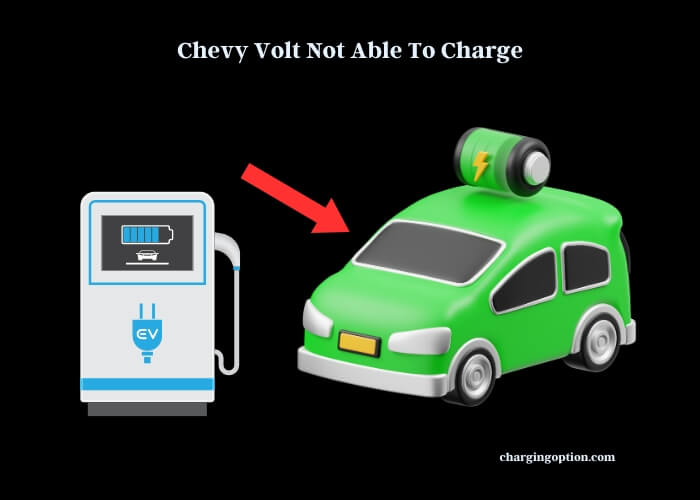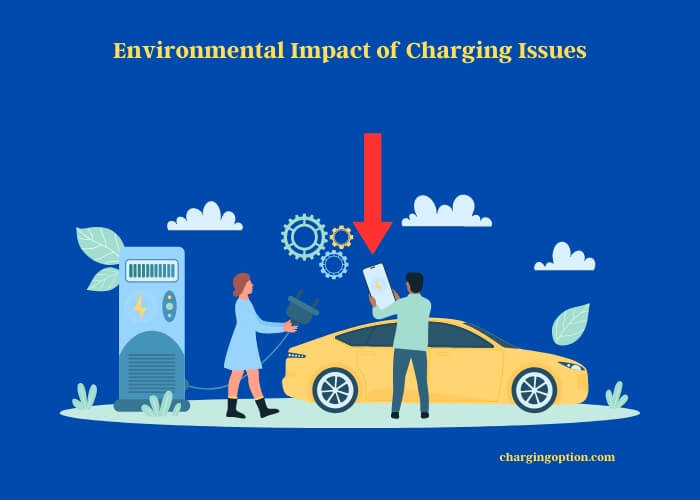Chevy Volt not being able to charge is often a symptom of a more complex underlying issue, which could be related to charging failure, battery issue, or even a software glitch in the system.
Charging failure could be tied to a connector defect or an electrical problem within the vehicle’s charging system. These defects might involve the charging station or arise from internal wiring faults, requiring a professional examination.

Battery issues are also a common reason for charging disruption. Whether it’s a malfunction within the battery itself or voltage inconsistency in the power management, these problems can halt the charging process.
Software glitches can interfere with charging as well. An outdated system might not communicate properly with modern charging stations, leading to failure in establishing a connection.
Service alerts are crucial in identifying and resolving these issues. They provide timely warnings that allow the driver to seek professional help, minimizing potential damage or inconvenience.
Chevy Volt Not Able to Charge: Analyzing Common Problems and Solutions
The Emergence of Chevy Volt Charging Issues
Background of the Chevy Volt
The Chevrolet Volt, a renowned hybrid electric vehicle, has attracted significant attention since its launch. Despite being a technological marvel, many owners have encountered the problem of their chevy volt not able to charge. This issue has become a matter of concern.
Statistics on Charging Issues
Reports indicate that a considerable number of Chevy Volt owners have faced charging troubles. It’s essential to monitor this trend to create awareness and find effective solutions.
Symptoms and Early Warning Signs
Unexpected Charging Stops
If your Chevy Volt halts charging unexpectedly, it may signal a malfunction. These interruptions could be intermittent or persist, warranting a closer examination.
Slower Charging Times
A significant increase in the time required to charge your Chevy Volt might indicate underlying problems with the charging system, battery, or both.
Indicator Lights and Alerts
Specific alerts or indicator lights on the dashboard may notify drivers about charging issues. Recognizing these signals early can prevent further complications.
Possible Causes of Charging Failure
Battery Problems
Damaged Cells
Physical damage to battery cells can lead to the Chevy Volt not able to charge. Regular inspection can help detect any damage or wear.
Overheating
Excessive heat during charging can cause the battery to malfunction, leading to charging failures.
Common Battery Fault Codes
| Fault Code | Description |
| P0AC4 | Hybrid Powertrain Control |
| P1E00 | Electrical System Error |
| P0D3E | Battery Cooling System |
Charger and Charging Cable Issues
Defective Chargers
Using a defective charger can result in failure to charge. Always inspect the charger for visible damage and functionality.
Damaged Cables
Cables with physical damage can also contribute to charging issues. Regularly checking the cable’s condition can prevent such problems.
Comparing OEM and Third-Party Chargers
| Type | Cost | Reliability | Compatibility |
| OEM Charger | Higher | High | High |
| Third-Party | Lower | Varies | May Vary |
Software Glitches
Firmware Bugs
Outdated or corrupt firmware may cause charging issues. Keeping the software up-to-date helps in ensuring smooth charging.
Sync Issues
Sometimes, synchronization problems between the vehicle’s system and charger might prevent charging. This could require professional intervention.
Electric Circuit and Outlet Concerns
Incompatible Outlets
Using incompatible or faulty outlets can lead to charging problems. Always use approved outlets designed for electric vehicles.
Voltage Fluctuations
Unexpected fluctuations in voltage levels might interrupt the charging process. Ensuring stable voltage can mitigate this issue.
Diagnostic Techniques for Charging Issues
Professional Diagnostic Tools
Taking your Chevy Volt to a professional technician equipped with specialized tools can identify the root cause of charging issues.
DIY Methods and Tools
Certain simple diagnostics can be done at home using basic tools and guidelines found in the vehicle’s manual.
Repair Options and Solutions
Authorized Service Centers
Taking the Chevy Volt to an authorized service center ensures that experienced technicians will handle the issue, often utilizing genuine parts.
Independent Repair Shops
For those looking for budget-friendly options, independent repair shops might provide a suitable solution. Ensure they have experience with electric vehicles, particularly the Chevy Volt.
DIY Repairs
If the problem is minor and well-identified, some enthusiasts might opt for DIY repairs using the vehicle’s manual and online tutorials.
Preventive Measures and Maintenance Tips
Routine Inspections
Regularly inspecting the battery, charging cables, and related components can help in early detection and prevention of charging issues.
Software Updates
Staying current with software updates can eliminate potential glitches that might lead to the Chevy Volt not able to charge.
Environmental Considerations
Being mindful of the environment, such as avoiding extreme temperatures, can prolong battery life and minimize charging issues.
Recommended Maintenance Schedule
| Task | Frequency |
| Battery Inspection | Every 6 Months |
| Cable Check | Every 3 Months |
| Software Update Check | As Released |
Cost Implications of Repairs and Replacements
Cost Comparison Between Different Repair Options
The cost of repairs can vary widely between authorized service centers, independent repair shops, and DIY solutions.
Warranty and Insurance Considerations
Always review the warranty and insurance policies, as they might cover some or all repair costs for charging-related issues.
Consumer Experiences and Community Support
Forums and Online Communities
Online forums dedicated to Chevy Volt owners offer a rich source of information, advice, and community support for those facing charging problems.
Case Studies and Personal Experiences
Some Chevy Volt owners have shared their personal experiences, offering valuable insights and practical tips to others facing similar challenges.
Legal and Regulatory Aspects
Recalls and Regulatory Compliance
Stay informed about any recalls or regulatory compliances related to the Chevy Volt. This information is often available through official channels.
Consumer Rights and Legal Remedies
Know your legal rights and remedies as a consumer. If necessary, legal advice might be required to address any disputes or issues.
Environmental Impact of Charging Issues

Efficiency Loss
Charging problems may result in efficiency loss, affecting both performance and the vehicle’s overall eco-friendliness.
Impact on Carbon Footprint
Failure to charge might lead to increased reliance on gasoline, thus contributing to a higher carbon footprint.
Alternative Transportation and Emergency Options
Rental Services
In cases where the Chevy Volt is not able to charge, rental services may provide temporary transportation solutions.
Public Transportation
Public transportation can also serve as an alternative when faced with unexpected charging problems.
Corporate Response and Manufacturer Support
Official Statements from Chevrolet
Monitor Chevrolet’s official statements regarding common charging issues, as they may offer guidance, support, or recalls.
Support Programs and Initiatives
Chevrolet may have specific programs to assist Chevy Volt owners facing charging problems, such as specialized customer service lines.
Comparison with Other Electric Vehicles (EVs)
Charging Reliability Across Brands
Comparing the Chevy Volt’s charging reliability with other brands can provide a broader perspective on the industry’s standards.
Comparing Chevy Volt with Other EVs
| Brand | Model | Charging Reliability | Cost |
| Chevrolet | Volt | Varies | $$ |
| Tesla | Model 3 | High | $$$ |
| Nissan | Leaf | Moderate | $ |
FAQs
What Are Some Common Charging Challenges for Electric Vehicles?
Overcoming obstacles in kia niro ev charging is crucial for electric vehicle owners. Common challenges include limited availability of charging stations, lengthy charging times, and compatibility issues with different charging networks. However, with advancements in technology and the growing infrastructure, these challenges are gradually being addressed, making EV charging more convenient and accessible for all.
Why Is My Chevy Volt Not Starting?
If your Chevy Volt is not starting, it may be due to a dead 12v battery, a malfunctioning key fob, or other underlying electrical issues. Consult the owner’s manual or take the vehicle to a professional technician to diagnose the problem.
What Does the Chevy Volt Yellow Charging Light Mean?
The yellow charging light on a Chevy Volt typically indicates a fault or warning related to the charging process. It could be a sign of a connection issue, a problem with the charging equipment, or a fault in the car’s charging system.
Can My Chevy Volt Still Run with a Dead 12 Volt Battery?
No, a dead 12-volt battery in the Chevy Volt can lead to the vehicle not starting or other electrical malfunctions. It’s essential to replace or charge the battery promptly to avoid further issues.
How Can I Fix the Blinking Red Light on My EV Charger?
If you’re wondering how to resolve the issue of a blinking red light on your EV charger, fixing a blinking red ev charger involves a few possible steps. Start by checking if there is any loose connection or debris in the charging port. Additionally, make sure the power supply is functioning properly and inspect the charger’s cables. If the problem persists, consulting the charger’s manual or contacting a professional might be necessary.
Are There Common Issues with Chevy Volt Delayed Charging?
Yes, Chevy Volt delayed charging might occur due to settings within the vehicle, problems with the charging equipment, or external factors such as extreme weather conditions. Refer to the vehicle’s manual or a technician for guidance.
What Should I Do if My Chevy Volt Won’t Turn On?
If your Chevy Volt won’t turn on, first check the 12v battery, key fob, and other basic elements. If no obvious issues are found, professional diagnosis might be required to pinpoint the problem.
How Can I Troubleshoot My Chevy Volt Unable to Charge?
Troubleshooting a Chevy Volt that’s unable to charge may involve inspecting the charger, cables, and outlets for damage or faults, updating the vehicle’s software, or seeking professional assistance if the problem persists.
Is There a Specific Meaning for the Chevy Volt Charging Indicator Light?
Yes, the Chevy Volt charging indicator light signals the status of the charging process. Different colors and patterns may represent various stages of charging or potential issues. Refer to the owner’s manual for specific details.
Summary
Charging problems with the Chevy Volt encompass a broad range of potential causes, symptoms, and solutions. From recognizing early warning signs to exploring repair options and preventive measures, this guide aims to provide Chevy Volt owners with practical information to navigate this common challenge.
Read More:
- Charging for the Future: The Importance of Sustainable Energy
- Car Alarm Goes Off When Charging Battery: Solved!
- Is It Cheaper to Charge an Electric Car Than Gas?
- Do Electric Cars Have an Alternator to Charge the Battery?
- Car Chargers: How Technology is Changing the Way We Power Up
- Charging Hybrid Cars: What You Need to Know
Additional Resources
